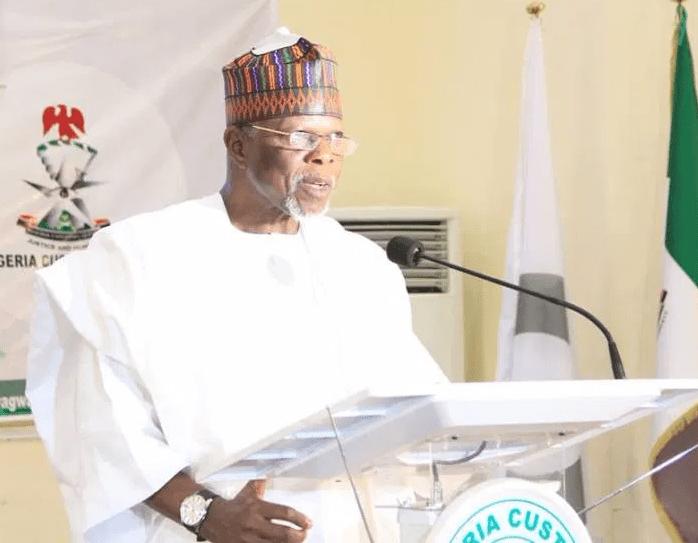Customs Report
‘Customs committed to release of priority shipments’ Ali


Abdullahi presenting his paper at the conference on behalf of the CGC
BY EGUONO ODJEGBA
Comptroller General of the Nigeria Customs Service, Col. Hamid Ali (Rtd) has assured of the readiness of the Service to implement the release of priority shipments in line with the World Customs Organization procedure.
Presenting a paper titled Trade Recovery and Simulative Incentives: Nigeria Customs Service Perspective at the 14th Nigeria International Maritime Ports and Terminals Conference and Expo (NIMPORT 2021), Ali said the recent global outbreak and the spread of Covid-19 virus greatly disrupted and threatened lives and means of livelihood, which adversely affected global social and economic trade.
The customs boss represented by the Customs Area Controller, Tin Can Island Port, Comptroller Musa Adbullahi, explained that amid the aforementioned economic disruptions, the NCS has outlined Trade Recovery programmes tailored to drive the WCO response template at overcoming the present challenges.
Abdullahi noted that the NCS which is statutorily saddled with the core responsibilities of revenue collection, anti-smuggling activities and trade facilitation, further noted that the present disruptions on trade demand could be as much as 13% to 22%.
This is even as he lamented that ocean and air freight to certain geographical location has already risen by over 400%. In recognition of above, Abullahi said to achieve trade recovery; NCS is poised to “expedite flow of international trade by avoiding measures that can adversely impact international supply value chain, while strengthening supply chain security as envisaged by the World Customs Organization (WCO) Safe Framework of Standards.”
Under the trade recovery measure which he explained is a process for coordination among customs administrations together with public and private sector stakeholders, the NCS he said is looking at coordination among customs administrations with regards to trade data, trade information, manifests etc.
In particular, the representative of the customs boss noted that given the circumstances and the sectoral concessions on agriculture, aviation, energy, health, mining, steel, etc; the NCS is also positioned to implement and expedite release of priority shipments.
He said, “The Nigeria Customs Service despite projection of revenue accruals and statutory customs control is being called to duty to implement the measures to enable and accelerate the desired recovery and keep the economy afloat.”
To achieve the WCO action plan on global trade recovery, Abdullahi outlined the implementation template put in place by the NCS.
“The NCS as a contracting party to the WCO Convention aligns its operations significantly with the conventions and recommendations of the WCO. One of such recommendations is the WCO Trade Recovery Guideline which aims to minimize the time or period of trade disruption thereby reducing the potential economic cost.
“This coordination includes customs administrations to other government regulatory agencies like NCDC, NAFDAC, SON, NSA, Port Health Authority, etc, and customs administrations to private businesses.
“This coordination is arising from the need to quickly recover from the disruptions in one or all sectors of the economy, for example, health, aviation and educational sectors etc.”
Also explaining the link between Trade Recovery and the Safe Framework, Abdullahi said the SAFE Framework deals with the security and facilitation of the global supply chain, designed to protect trade against adverse disruptions.
“To this effect, the Nigeria customs Service has deepened the implementation of the Framework of Standards and its associated tools in an effective and harmonized manner and has achieved the following: Advance Electronic Information (AEI)
“By partnering with other national administrations, customs is able to obtain advance electronic information about the nature of import-consignment before it is exported from the originating country to enable customs detect high risk consignments as early as possible and to eliminate delays on the clearance of low risk consignments.”
He outlined other key elements of the Trade Recovery and SAFE Framework to include Cooperation and Stakeholder Engagement; Partnership between Customs and the private sector (Stakeholders), which he said is fundamental towards securing the global supply chain.
Two, to sensitize the private sector to be able to ensure quality controls on their shipments and to ensure they meet compliance standards on imports and exports. This allows for predictability and enables facilitation and also allows the private sector to benefit from a seamless clearance process.
According to Abdullahi, the trade recovery tools include adoption and implementation of fast track facilities.
“This is a compliance-based facility to encourage compliant traders who have the benefit of direct delivery of consignment to the owner’s premises where customs clearance will be conducted by the Post Clearance Audit.
He explained that as part of the trade recovery efforts, NCS implemented the WCO trade recovery guidelines and tools through the following action:
“Established Standard Operating Procedures (SOP) for trade recovery in consultation with relevant Government Agencies, Businesses and other Stakeholders.
“Established and maintained communication channels with other Government Agencies involved in, and represented during the cargo clearance process such as NAFDAC, Port Health, SON, NDLEA, etc.
“Established a procedure and criteria for facilitating the movement of high priority cargo, for example, various medicaments, medical and surgical equipment and tools sponsored by the National Centre for Disease Control (NCDC).”
The others according to him is the establishment of appropriate criteria for identification of high-risk cargo and their nationalities; deployment of appropriate technology for facilitating the examination and clearance of priority cargo through Non-Intrusive; Customs Information System (NICIS II) for cargo clearance; and Inspection (NII) equipment such as scanners etc.
Abdullahi maintained that trade recovery through trade facilitation initiatives, prompt and timely implementation of Government Fiscal and Monetary Policies will continue to receive the desired attention of Nigeria Customs Service.
It must be emphasized that under Col. Ali, the NCS have made tremendous stride in trade facilitation, irrespective of pockets of opinions to the contrary. While NCS have insisted that the regime of inspection cannot be wished away under the prevailing high national insecurity nationwide, compounded by importation of restricted and contraband drugs, arms and ammunition, the service has through profiling and identification, supported large scale trade facilitation especially amongst manufacturers, industrial importers and others with proven import documentation integrity.
It is interesting to note that of all the two hundred member nations of the World Customs Organisation, only fourteen has been adjudged to be simplifying their processes and procedures, with Nigeria Customs Service in the global chart of compliance.

Meanwhile, the TCIP Command under the watch of Abdullahi has responded in significant measure to the threats of unwholesome imports including the recent threats of a Colorado Drugs, Cannabis, arm and ammunition.
Fighting side by side with Abdullahi are his dedicated deputies, among them, Deputy Comptroller Caroline Ebun Ayo, Officer-in-Charge of the Command Vehicle Seat at Tin Can Island Container Terminal (TICT).
The command through her meticulous supervision always remained a step ahead of the smugglers pretence, which resulted in several offensives since assuming duty at the command in April 2019.
As Deputy Controller TICT, the command has intercepted high profile offensive imports, including armoured Hilux ARM with no End-User-Certificate, Cannabis, Arms and Ammunition, Guns, Military Uniform, assortment of unlawful Drugs, etc.
Although overdue, it was not surprising that Ebun Ayo got promoted in the latest exercise to the rank of a Comptroller; effectively attaining her career peak as a commissioned customs officer.
A competent, meticulous and no nonsense officer with zero tolerance for misconduct and or acts incompatible with the rules of engagement, Ayo is a product of intellectual power house, and holds a PSC (+) in addition to holding the Distinguished Service Medal. Her contributions to the overall performance of the command and its anti-smuggling activities are not only significant, but far reaching and substantial.
As she gets decorated today with her new rank, the NCS continues to raise the bar in the addition of committed crack officers at its management cadre.


























